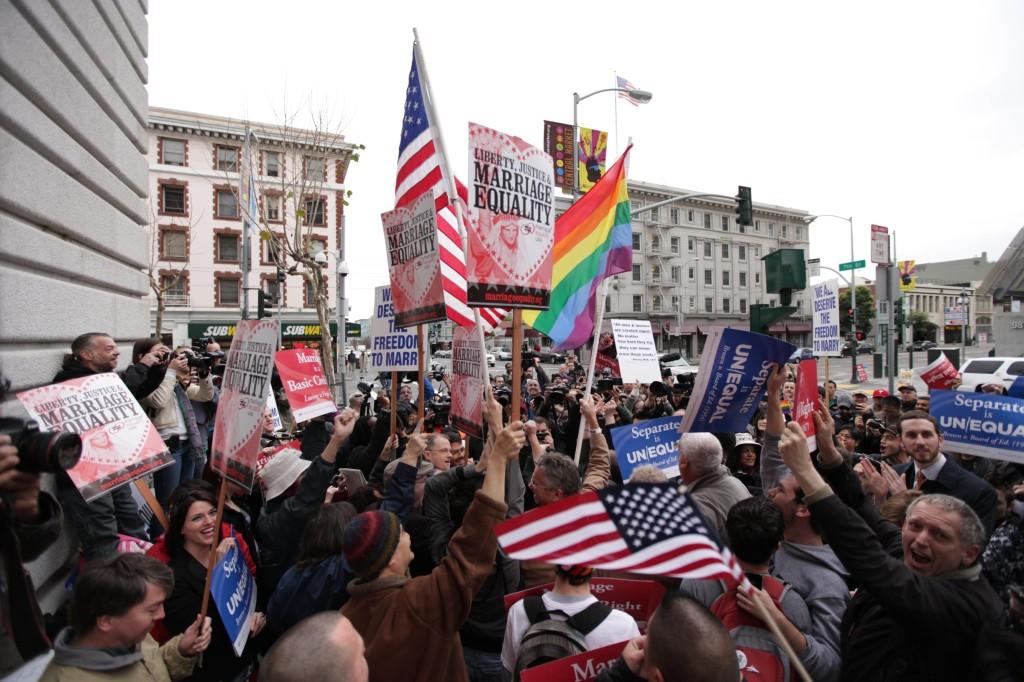Gay marriage supporters around the Bay Area and state rejoiced in the news of Prop 8 renounced and stripped of its power.
“Our Family is now included in the American dream…it’s amazing,” said Frank Capley-Alfana, who was accompanied by his partner Joe Capley-Alfana. “The courts have upheld equality and freedom in our nation.”
Tuesday February 7, at 10 a.m. the U.S 9th Circuit Court of Appeals in San Francisco released its ruling on same-sex marriage in California, finding it to be unconstitutional and an infringement on the rights of citizens.
The ruling came as no surprise to those gathered outside of the courthouse in San Francisco to hear the ruling. “Who wants to get married now!” the crowd shouted in celebration.
Students on campus echoed some of the elation. “Finally! We can strike a black mark from California’s record,” said Brenan L. Peterman 19, culinary arts.
After hearing arguments a year ago, tuesday’s ruling was handed down by a panel composed of three judges to determine whether a state ban on same-sex marriage was constitutional.
In 2010, U.S Judge Vaughn Walker declared proposition 8 to be unconstitutional and a violation of the Due Process and Equal Protection clauses of the 14th amendment of the U.S. Constitution.
Same-sex marriage has been a hot topic on the tips of the tongues for Californian’s ever since it was first made a voting issue after the turn of the millennium.
In March of 2000 voters passed proposition 22 defining marital union as, “only marriage between a man and a woman is valid and recognized in California.”
Proposition 22 set the stage for the first of many legal battles as the California Supreme Court ruled the ban was unconstitutional and a violation of equal rights protections. The following day more than 18,000 same sex couples got married.
Yet only six months later voters turned out to support proposition 8 on Nov. 4 2008, when voters narrowly passed the ban with 52 percent in favor and 48 percent against.
“It just kinda broke my spirit, ” recalled DVC English teacher, Heidi Goen-Salter after hearing the news. “I haven’t been that depressed since that day.”
Proposition 8 allowed for a unique type of direct democracy from Californian voters, who used the Ballot Initiative to pass the proposition, which added a new section to the Declaration of Rights in the California Constitution that banned same-sex marriage.
The campaigns to garner votes and support raised $39 million in favor of proposition 8 and $43 million against respectively. Combined it was the highest earning campaign in any state and the highest of any political campaign aside of the presidency.
“Prop 8 raises important questions about institutional discrimination,” said Dorrie Mazzone, DVC professor of Political Science, recounted her reaction to hearing the news of proposition 8 passing in 2008.
“It impacts all Californians because it legalizes a form of discrimination. Even more broadly, though, it asks that we think about why we tie so many benefits to the institution of marriage. Why do we deny other forms of kinship the same access to benefits?” Mazzone said.
Numerous lawsuits were filed in the state contesting the 2008 ruling. In early January 2010, two couples found themselves at the center of a Federal trial challenging the constitutionality the same-sex marriage ban. This landmark case, Perry v. Schwarzenegger, was the nation’s first look into the legal bounds of same-sex marriage.
After hearing the arguments for over a year, U.S District Judge Vaughn Walker ruled in favor of Perry that banning same-sex marriage was unconstitutional. But before any marriages could take place an appeal was filed, requesting a look into whether Judge Walker should have recused himself out of conflict of interest. That appeal postponed a ruling on the case until tuesday’s announcement.
Tuesday’s court’s decision likely won’t be the final word in the fight over marriage equality. Many people anticipate continued appeals and the case making it to the U.S. Supreme Court before gay people in California can marry again.
“Those opposed to gay marriage have vowed to take the case to the US Supreme Court, so we’re not out of the woods yet.” Mazzone said.






































































